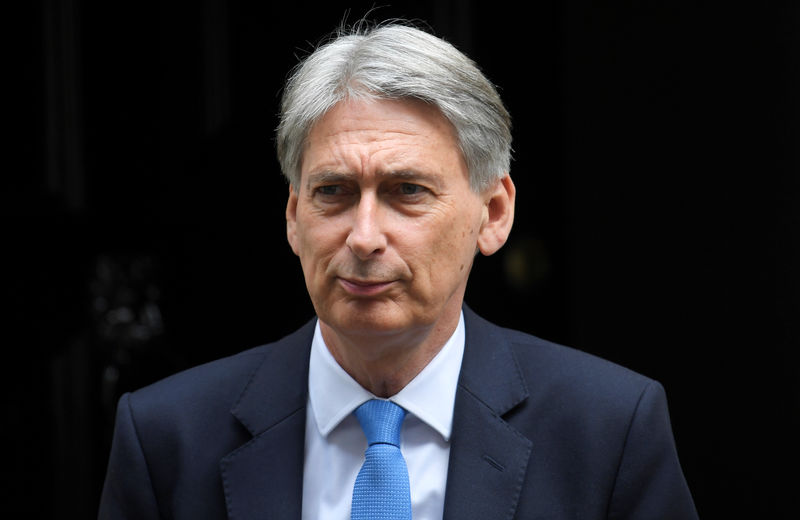By Andy Bruce and William Schomberg
LONDON (Reuters) - Britain unexpectedly posted its smallest budget deficit for any August since 2007, helped by record sales tax revenues that could give Chancellor of the Exchequer Philip Hammond room to relax his grip on spending in an upcoming budget.
The deficit in August stood at 5.7 billion pounds, down 18 percent compared with the same month last year, the Office for National Statistics said on Thursday, citing figures that exclude state-controlled banks.
The shortfall for August was smaller than all forecasts in a Reuters poll of economists that had pointed to a much larger deficit of 7.1 billion pounds.
August's strong performance followed an unexpected surplus in July, a relief for Hammond who is under pressure to loosen spending constraints when he announces budget plans in November.
With almost half of the financial year complete, Hammond looks on track to undershoot the 58 billion pound borrowing target for 2017/18 set by Britain's official budget forecaster.
"All of this suggests that the chancellor should have room for some easing of austerity in his budget in November," said John Hawksworth, chief economist at PwC.
Last week, Prime Minister Theresa May agreed to ease seven years of public sector pay caps, but only modestly and only for police and prison guards.
The government also faces calls for more spending on the health service, housing, infrastructure and a further relaxation of the pay cap for public sector workers.
The finance ministry said it had made substantial progress in cutting the deficit but the national debt was still too high.
Analysts have said they expect 2017/18 to be a difficult financial year, in part because of a slowing economy after last year's Brexit vote.
But value-added tax receipts rose 5.6 percent to 11.6 billion pounds in August, the highest for that month on record.
The VAT figures, based on forecasts for the coming three months, could be another sign that consumer spending is holding up despite rising inflation and weak wage growth.
Corporation tax revenues fell 4 percent compared with August 2016, however, and were flat for the financial year so far.
While government debt interest payments dipped in August, they were still up 17 percent in the year to date, pushed up by the post-Brexit vote rise in inflation. Around a third of British government bonds are linked to inflation.
A move by the Bank of England to raise interest rates in November -- something it signalled was likely last week -- could increase debt payments further.
Britain has been struggling to fix its public finances since the deficit surged to around 10 percent of gross domestic product in 2010 after the financial crisis.
Since then it has been cut steadily, to 2.3 percent of GDP in the 2016/17 financial year which ended in March, its smallest since before the global financial crisis.
But the deficit is expected to widen again to 2.9 percent of GDP this year when Hammond will have fewer one-off factors to help him than last year.
Hammond has not committed to balance the budget until the middle of the next decade, giving him flexibility to slow the pace of deficit reduction if needed to support the economy through Britain's departure from the European Union.
But JPMorgan (NYSE:JPM) economist Allan Monks warned that if the official budget forecaster strikes as gloomy a tone about Britain's economic prospects after Brexit as BoE Governor Mark Carney did last week, this could limit Hammond's room for manoeuvre in coming years.
